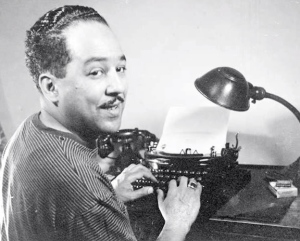 The poet Langston Hughes was the ‘laureate’ of poor African Americans during the 1920s and 30s in Harlem. He was part of a movement known as the Proletarian Poets, ones whose writing had a class consciousness to it, that didn’t hold back in its description of the plight of working class people during the difficult inter-war decades of the early 20th century. His poems conveyed the hardship and discrimination facing black people during that time and which resonates today.
The poet Langston Hughes was the ‘laureate’ of poor African Americans during the 1920s and 30s in Harlem. He was part of a movement known as the Proletarian Poets, ones whose writing had a class consciousness to it, that didn’t hold back in its description of the plight of working class people during the difficult inter-war decades of the early 20th century. His poems conveyed the hardship and discrimination facing black people during that time and which resonates today.
However, critics claimed that Hughes was portraying the black experience in a negative way, one that showed them as helpless, feckless even. There was nothing positive. On reading Hughes’ poems you can see why people took such a view. Take Ballad For The Landlord, which describes a man’s fight with his landlord over the state of his apartment block and subsequent arrest for making the complaint. The power lies with the landlord of course, who exploits his tenant who can do nothing about his plight.
In his defence, Hughes said that he didn’t know any wealthy, highly educated people (black or otherwise) and only wrote what he saw. But he also wrote poems that are declarative and uplifting as with Democracy:
Democracy will not come
Today, this year
Nor ever
Through compromise and fear.
I have as much right
As the other fellow has
To stand
On my two feet
And own the land.
I tire so of hearing people say,
Let things take their course.
Tomorrow is another day.
I do not need my freedom when I’m dead.
I cannot live on tomorrow’s bread.
Freedom
Is a strong seed
Planted
In a great need.
I live here, too.
I want freedom
Just as you.
This is a dilemma facing writers in how they portray the working class. If there are only ever horror stories of how terrible life is, or fairy tales of how people escaped from such a life, then we are missing a great deal of the picture. More importantly, this can then lead to negative stereotyping and possible demonisation, as Owen Jones has demonstrated.
This, I hope is a good starting point for looking at how poets today are writing about the working class. It is not so much about the truth in what they are saying, unless of course it is gratuitously negative, but about the balance and tone of the whole picture.
Great poem, it’s almost like Mr Deeds has been reborn!
LikeLiked by 1 person
Nice site! Good to see proletarian poetry. It can also be found in the Blue Collar Review. Always good to see more.
LikeLike